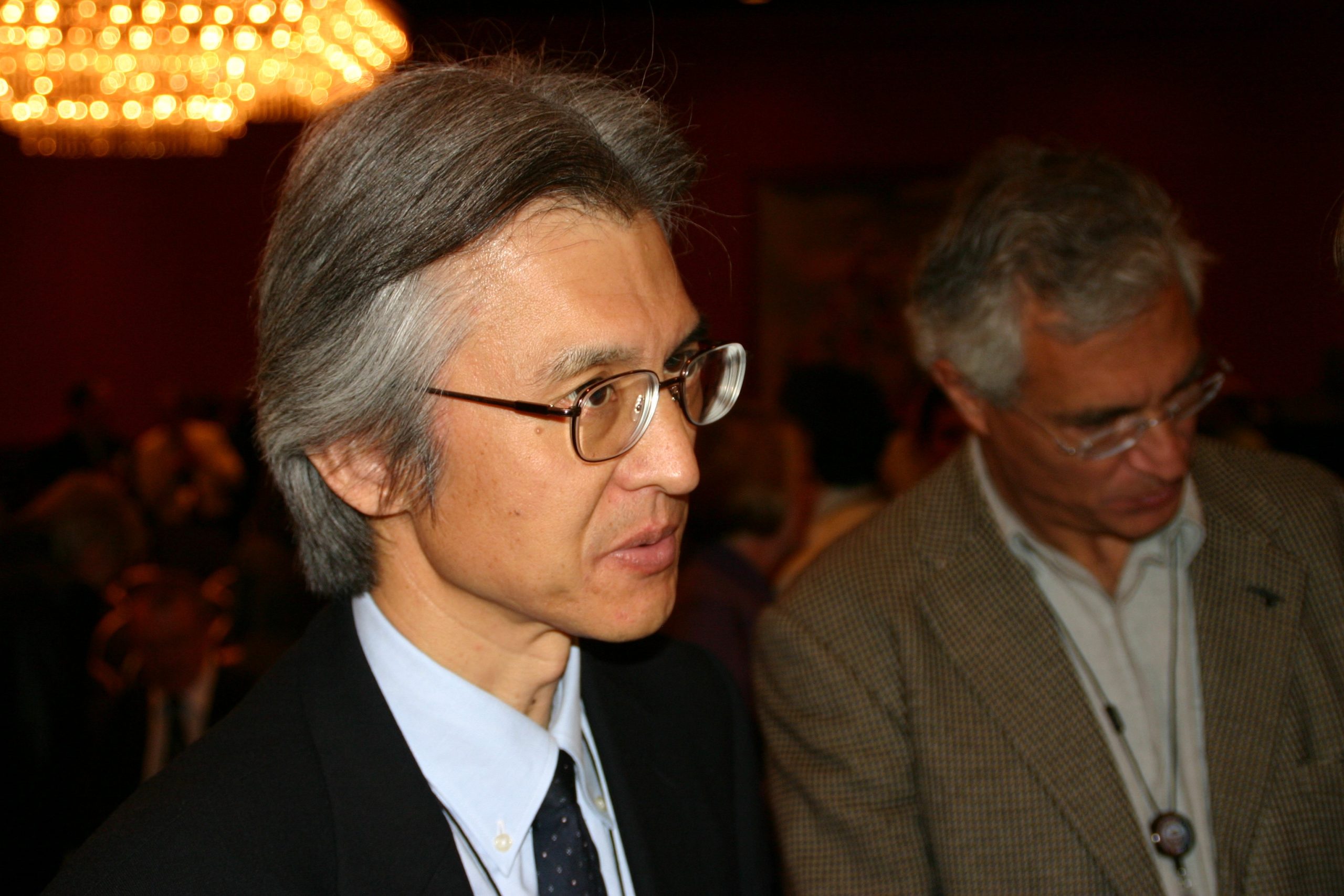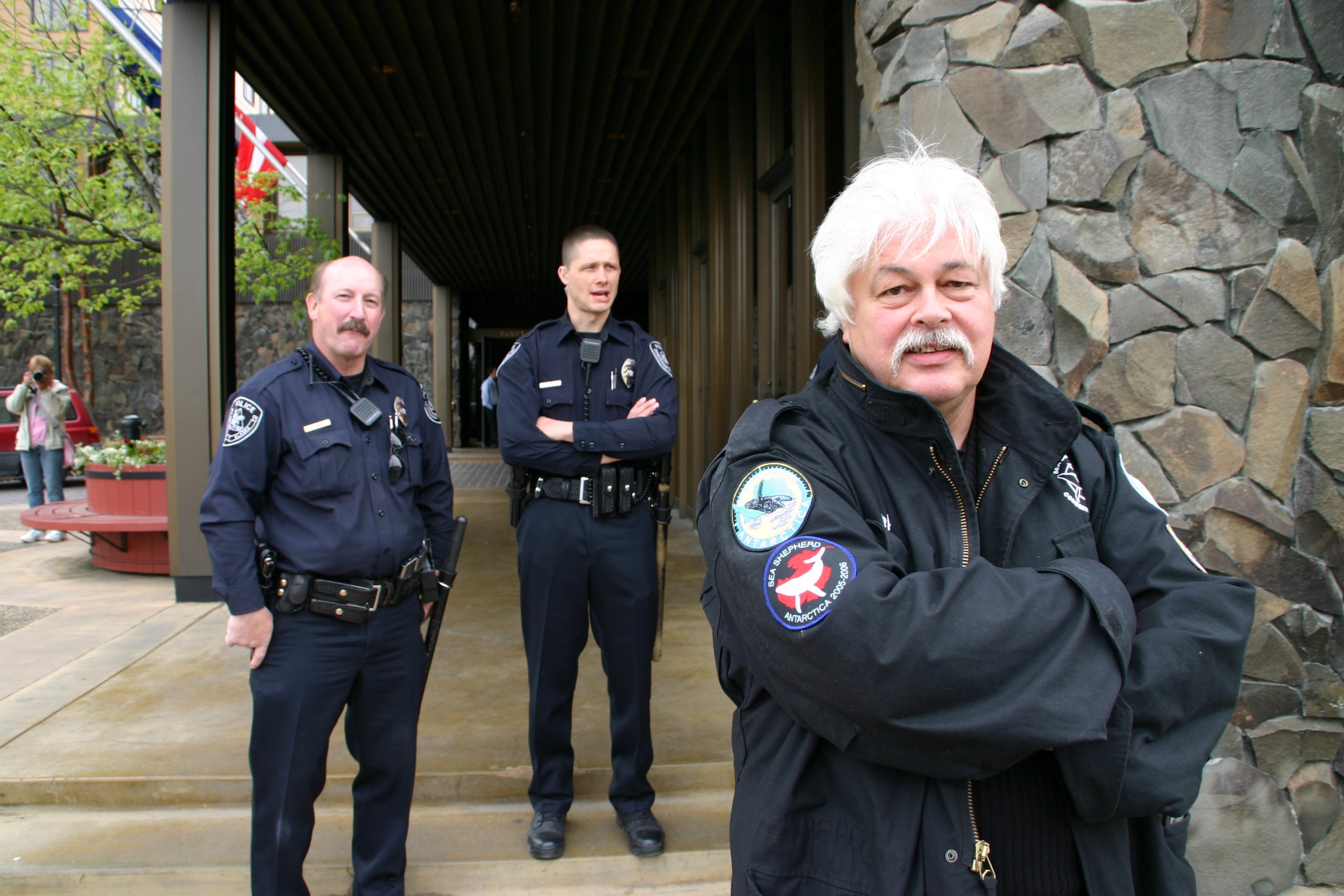Back to the starting block for Japan’s multi-million dollar campaign to overturn the international whaling moratorium.
David McNeill
The look on Nakamae Akira’s face said it all. In the somber press conference that followed the end of the 2007 International Whaling Commission conference in Anchorage, the deputy director of Japan’s Fisheries Agency was as impassive as an Alaskan iceberg.. Japan’s silk-smooth spokesman Morishita Joji as always did most of the talking. When Nakamae did eventually answer a single question after spending the bulk of the press conference staring out the window of the Hotel Captain Cook, he was brutally direct: “Why should we leave the IWC, we’re not the problem.”
“Unlike the anti-whaling countries, we abide by the original mission of the IWC — the conservation and managed use of all marine resources,” he said. “The IWC should accept sustainable use. The countries which deny any take of whale should leave, not us.”

Morishita Joji at the IWC Conference
After four days that began with high hopes of an end to two decades of deadlock, the Fisheries Agency’s (FA) billion-dollar campaign to overturn the international ban on commercial whaling is again in ruins. The small pro-whaling majority that shocked conservationists at last year’s St. Kitts & Nevis conference has been slashed, coastal whaling was again harpooned and Japan’s scientific whaling program was condemned in a massive 42-2 vote, after most of the pro-whaling countries abstained. Back to square one for Japan.
Officially 29,000 whales have been culled since the commercial whaling ban came into effect in 1986, most by Japan, Norway and Iceland. Many more have been snagged in fishing nets, a “by-catch” that conservationists say causes 300,000 fatalities a year. Others die in collisions with ships or from ingesting sea debris. The small amount of meat harvested is increasingly too polluted to eat. Iceland’s commercial whaling campaign — restarted last year — has been stalled, perhaps permanently, by concerns about mercury and other chemicals detected in whale carcasses.
Unsurprisingly, the conservationists in Anchorage were as incensed as ever that harpoon-wielding men in oilskins are adding to the whales’ woes. “With so many other factors impacting whale populations worldwide, it is incredible that the IWC is still entertaining the idea of commercial whaling,” said Sato Junichi of Greenpeace Japan.
Like most of his conservationist colleagues, Sato wants to transform the IWC into a “body that works for the whales and not the whalers.” The pro-whaling nations see the IWC in exactly opposite terms, clinging to what they say is its original mandate, the managed, sustainable use of whale resources. Japan in particular has never accepted the conservationist takeover of the IWC and has waged a $750-million ODA campaign to swing the organization back to support for commercial whaling. Last year, it won a narrow vote for the first time in a quarter of a century, a symbolic victory that stunned environmentalists.
That victory was short lived. Six new anti-whaling nations signed up while Japan managed to recruit just one: Laos. Several poorer pro-whaling nations failed to appear in Alaska, apparently discouraged by the distance and cost. Either way, a return to commercial whaling, which needs a 75 percent IWC majority, is as far away as ever. Australia’s alternate IWC Commissioner Conall O’Connell said recently that the IWC membership, currently 77 nations, could expand to 120 within a decade, most anti-whaling. Japan faces a stark choice: either swim with the growing environmentalist tide or abandon the deadlocked commission altogether.
There is one other option: Stay around and make life difficult for anti-whalers. Many feared that frustrated Fisheries Agency officials might kill off one of the conference’s key votes: the aboriginal whaling quota in Alaska, Greenland, Russia and a handful of other local communities. The Agency resents that those hunts are classed as “subsistence” while under IWC rules the proposed whaling of four local fishing communities in Taiji, Wakayama Prefecture, Abashiri in Hokkaido, Ayukawa (Miyagi) and Wada in Chiba is “commercial.”

Members of the Indian group Makah Nation protest
outside the Hotel Captain Cook, demanding that the
IWC renew its quota to kill a small number of gray whales.
“Why is aboriginal whaling allowed in the US but not in Japan,” asked Morishita, a reference to the award of a quota of about 50 fin whales to Alaskan coastal communities. Critics say the key difference is that Japan wants to sell its whale-meat commercially while aboriginal communities cull the animals to survive. The distinction is easily understood elsewhere. But in a country where the media selectively reports the whaling controversy, many people buy Morishita’s claim that the West doesn’t know its sei from its sardines.
In the end, and mindful of the political fallout from 2002 when it angered the US by blocking Aborigine whaling in revenge for failing to win its own quota, Japan went along with the vote. In return, it hoped but failed to win concessions on coastal whaling — what Morishita called Japan’s key priority. The second major part of the FA’s approach was to use the promised cull of 50 humpback whales later this year as a bargaining chip, a tactic that badly backfired.
Japan test-drove the humpback strategy when it huddled mid-conference with New Zealand, Australia, Britain and several other “like-minded” countries for “unprecedented” talks, according to NZ Environment Minister Chris Carter. But the talks fizzled with the pro-whaling side accusing Japan of trying to “blackmail” them. “There was nothing on the table except for the humpback hunt, which should be treated with the absolute contempt it deserves,” fumed UK Bio-Diversity Minister Barry Gardiner. “It is not a concession to up the stakes dramatically then offer to take it away if we don’t give them something.”
Time will tell whether the humpback kill – tailor-made to anger New Zealand and Australia which both have important whale-watching industries — is just a negotiating ploy, now failed. The FA has reportedly commissioned a new $140 million whaling boat following a fire on the whaling mother ship the Nisshin Maru, but Morishita gave a tight-lipped “no comment” on whether the hunt would go ahead. Paul Watson, the leader of the direct-action environmental group Sea Shepherd Conservation Society, who prowled the hotel outside throughout the conference after being ejected by police, had a stark message for the FA: “Bring it on. The humpback hunt will be the biggest recruiting tool we have ever had.”

Sea Shepherd founder Paul Watson outside the Hotel Captain Cook after being
ejected from the IWC conference
The humpback is classed by most environmentalists as one of the planet’s more imperiled species, but not by Japan. “We don’t see it as endangered,” said Morishita, who spends much of his time at IWC conferences surrounded by a buzzing hive of Western reporters, patiently explaining in flawless English that Japan is not the Darth Vader of the marine world. “It is not true that we want free, uncontrolled whaling,” he said. “We would like to have managed controlled whaling, with quotas and enforcement.”
The huge contingent of Japanese delegates can be easily spotted at the conferences in the salary-man uniform of dark suit and dangling mobile-phone strap. They mostly sit in stony-faced silence listening through interpreters to three days of grandstanding and mud-slinging, as Japan’s painstakingly collected research on whales is thrashed as “junk science.”
Many conservationists are contemptuous of Japan’s claim that whales eat “five times more fish” than humans and must therefore be culled. One of the more memorable recent statements on that research came from marine scientist Dr. Daniel Pauly who said: “Birds consume 100 million tons of fish a year but if you proposed culling birds, you would get a declaration of war from the United Kingdom.”
The only bright spot for the Fisheries Agency was a joint coordinated resolution with New Zealand on harassment of Japan’s whaling fleet at sea, which passed by consensus and saw the UK and other pro-whaling nations slam Sea Shepherd. “Britain wholeheartedly condemns” the ramming of boats at sea, said Gardiner, who explained that Sea Shepherd’s UK-registered ship the Robert Hunter had been ordered to remove its Union Jack, weeks before it apparently deliberately crashed into the Nisshin Maru earlier this year.
But even that unanimous discussion was marred by controversy. Japan and its pro-whaling allies dubbed the eco-groups “terrorists,” deliberately blurring the distinction between the direct-action tactics of Sea Shepherd and the more moderate environmentalists, and called for the withdrawal of Greenpeace’s observer status at the whaling body. There was muffled laughter in the conference hall when some pro-whaling delegates called for Greenpeace funds to be seized and its members arrested. “Japan needs to control its troops,” said environmental lobbyist Remi Permentier afterwards.
The conference also exposed the hypocrisy of the anti-whaling countries. The UK said little about Norway’s planned cull of 1050 minke. “The Norway whales are being slaughtered closer to Aberdeen (Scotland) than Oslo,” says Andy Ottaway, Campaigns Director for Campaign Whale. “Many of these whales migrate through British waters.” The reason? “Britain has just created a gas deal with Norway and has strong trade links.”
So what now? Will Japan pull out, after issuing its umpteenth threat? “Any kind of patience always has a limit,” warned Morishita at the final press conference. But most people accept that Japan has no choice but to stay in the crippled organization. That means millions more spent on a campaign that Japan has zero chance of winning. The only people who can stop that are the taxpayers, which is why the FA – and the stone-faced Nakamae — carefully played to the TV cameras back home where the real fight takes place. The “anti-terrorist” resolution, when the FA delegates switched to Japanese and showed attention-grabbing footage of the whaling fleet being targeted by Sea Shepherd, seemed specially tailored to the domestic audience. “They must keep playing the victim so that they can get the support of the Japanese public,” said Sato of Greenpeace Japan.
Conservationists can hardly rest on their laurels after Alaska: Scientific whaling goes on, Greenland got a boosted aborigine quota, and a proposal for a new South Atlantic Whaling Sanctuary was killed off. Norway will hunt over 1000 whales. Above all, hundreds of thousands more will die in accidents, and what environmentalists call the “secret slaughter” of 17,700 Dall’s porpoises is still carried out in Japan’s coastal waters every year outside the jurisdiction of the IWC. What was again clear is that the conference, and the annual shower of mostly tax-funded bile it generates, is in many ways a sideshow from the real threats facing marine life: global warming, pollution and bycatches. . As Greenpeace pointed out, all that vitriol left little time for discussion on “genuine conservation issues” or the 3,288 cetaceans that died while the conference delegates fought.
David McNeill writes regularly for the Chronicle of Higher Education, the London Independent and other publications. He is a coordinator of Japan Focus.
He wrote this article for Japan Focus. Portions of it have appeared in Newsweek Japan and the South China Morning Post. Posted at Japan Focus on June 7, 2007.


